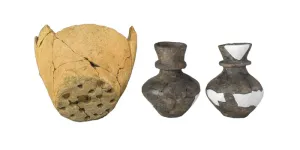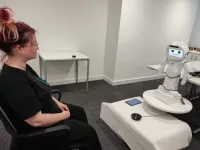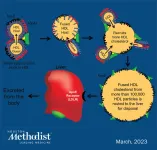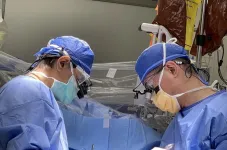(Press-News.org) Health information on M(onkey)pox, posted on the social media platform TikTok, is often inaccurate, incomplete, and of poor quality, finds a recent analysis of relevant videos, published in the open access journal BMJ Global Health.
The findings highlight the potential risks of using social media for health information, particularly during public health emergencies, warn the researchers.
Mpox, formerly called monkeypox, usually describes fever, swollen lymph glands (lymphadenopathy), and painful skin pustules all over the body that last from 2 to 4 weeks.
With more than 1 billion users in 2022, TikTok is one of the most active social media platforms used today to access and share information on timely public health issues, note the researchers. Its users can easily create videos lasting between 15 seconds and 5 minutes.
The researchers wanted to assess the content, quality, and level of engagement of video content on the Mpox outbreak on the platform.
They carried out an online search of relevant video content uploaded between 1 January and 11 August 2022, using 12 hashtags. The initial search returned 2462 videos, but only those that were original, in English, and contained educational content were included in the analysis. After manually checking each video, 85 were left.
The videos were evaluated for content on features and treatment of Mpox. Video and information quality was assessed using three validated tools for evaluating health information, which included DISCERN and the Journal of the American Medical Association (JAMA) criteria.
The video authors were categorised as doctors and science communicators; institutions; nurses and other healthcare workers; and the general public. And information on the number of followers they had, who they were following, and the total number of posted videos and likes was collected.
The average length of the videos was 78 seconds. The average value of received likes, comments, and shares for each video was 11,015, 211, and 693, respectively.
The most common video authors were doctors and science communicators (43.5%; 37), followed by the general public (35%; 30), nurses and other healthcare workers (13%; 11), and institutional users (8%;7).
Video content was assessed, using six content categories related to Mpox in clinical practice. Most (85%) addressed Mpox risk factors, but, on average, the videos addressed only a third of the content items highlighted in clinical practice guidelines.
The overall average score for the videos was 39.56 out of 80 on the DISCERN instrument and 1.93 out of 4 on the JAMA criteria, indicating that the overall quality of information in the videos was poor. No video met all the JAMA criteria.
Overall scores for quality were higher for videos produced by doctors and science communicators than for those made by institutional users or nurses, with those produced by the general public achieving the lowest scores.
The inclusion of people in the video and information on the quality of treatment choices were significant independent determinants of audience engagement.
The researchers acknowledge various limitations to their findings, including the relatively short time period covered by the study, the fact that the DISCERN and JAMA instruments were originally designed to evaluate website information, and the absence of information on the behavioural and psychological impacts of the videos.
But they nevertheless, point out: “Overall, the material on the recent Mpox outbreak shared through TikTok videos was frequently unreliable and incomplete, hindering public health efforts to share accurate information on Mpox.”
While the poor quality content of most videos may relate to the limited information available on Mpox and its novelty, guidance is needed for health information content, given the crucial role this has, they insist.
“Our quality-of-information results emphasise the need for developing instructions on health information videos on social media and for encouraging more content from health professionals,” they write.
And they conclude: “Our study highlights the risks of referring to TikTok or social media as a health information source….Poor quality videos with biased content may lead to confusion and impair successful informed decision making. This exacerbates the ‘infodemic’ on social media, deterring efforts to prevent and manage disease outbreaks, notably the Mpox outbreak.”
END
TikTok health information videos on Mpox often inaccurate and of poor quality
Findings highlight potential risks of using social media for health information
2023-03-15
ELSE PRESS RELEASES FROM THIS DATE:
Altered “neuronal avalanches” in brains of epilepsy patients tied to cognitive performance
2023-03-15
New research by the Human Brain Project has found that in the brains of patients with epilepsy, changes in large scale neuronal activations can be detected in the brain’s resting state activity, even when no seizure is ongoing. The non-invasive approach could lead to a new method to aid epilepsy diagnostics.
Diagnosing epilepsy can be problematic for patients, who sometimes have to wear helmets and electrodes for prolonged periods of time waiting for an epileptic episode to happen, so that the clinicians can document it with EEG. Alternatively, the seizure is artificially induced, causing discomfort.
The new ...
Neolithic ceramics reveal dairy processing from milk of multiple species
2023-03-15
A new study has found evidence of cheesemaking, using milk from multiple animals in Late Neolithic Poland.
The research suggests that early farmers reduced the lactose content in milk by making it into cheese or other dairy products like yoghurt, and used dairy products from a number of different animals, such as cows, sheep or goats.
Lactose intolerance was a common condition in almost everyone in Europe during the Neolithic and until the Late Bronze Age when the genetic mutation became widespread, enabling adults to produce lactase, the enzyme which breaks down lactose in the body.
Researchers looked at the practice of dairy processing ...
Community health workers can help protect pregnant women and their babies from malaria
2023-03-15
Community health workers can make a great difference in increasing the number of pregnant women who receive life-saving preventive antimalarial treatment, according to a study conducted in four sub-Saharan African countries and led by the Barcelona Institute for Global Health (ISGlobal), an institution supported by “la Caixa” Foundation. The findings, published in The Lancet Global Health, will help to guide malaria control strategies in pregnant women and improve maternal and infant health in malaria-endemic ...
Robots can help improve mental wellbeing at work – as long as they look right
2023-03-15
Robots can be useful as mental wellbeing coaches in the workplace – but perception of their effectiveness depends in large part on what the robot looks like.
Researchers from the University of Cambridge carried out a study in a tech consultancy firm using two different robot wellbeing coaches, where 26 employees participated in weekly robot-led wellbeing sessions for four weeks. Although the robots had identical voices, facial expressions, and scripts for the sessions, the robots’ physical appearance affected how participants interacted with it.
Participants who did their wellbeing exercises with a toy-like robot said that they felt more of a connection ...
Knowing your ants from your anteaters: are wildlife documentaries showing us the ‘real’ natural world?
2023-03-15
Wildlife documentaries miss an opportunity to highlight the diversity of nature by focusing too much on mammals and birds, according to a new study.
In a new study published in People and Nature, researchers from the University of Cambridge have shown that while the production of wildlife documentaries has exploded over recent decades, they portray a biased view of the natural world around us.
Our natural world is under threat, from habitat and biodiversity loss, to high extinction rates. At the same time, there is a growing disconnect between people and nature, with children’s opportunities to experience the natural world diminishing.
Now more ...
Propeller advance paves way for quiet, efficient electric aviation
2023-03-15
Electrification is seen as having an important role to play in the fossil-free aviation of tomorrow. But electric aviation is battling a trade-off dilemma: the more energy-efficient an electric aircraft is, the noisier it gets. Now, researchers at Chalmers University of Technology, Sweden, have developed a propeller design optimisation method that paves the way for quiet, efficient electric aviation.
In recent years, electrification has been described as having an important role in reducing emissions from future aviation. Due to the challenges posed by longer ranges, interest is chiefly focused on electric propeller planes covering shorter distances. Propellers connected to ...
People of color have been largely underrepresented among authors published in the American Journal of Archaeology
2023-03-14
A new demographic survey of authorship in the American Journal of Archaeology (AJA) reveals that people of color have been largely underrepresented among the scholars published in the journal. The results of the survey, which also found that authors who are the children of people without advanced degrees were also underrepresented in the journal’s pages, are published in the paper “Demographic Dynamics of Publishing in the American Journal of Archaeology.” The study was conducted ...
Common cold gives children immunity against COVID-19
2023-03-14
During the pandemic, medical doctors and researchers noticed that children and adolescents infected with COVID-19 became less ill than adults. A possible explanation for this is that children already had a prior level of immunity to COVID-19 provided by memory T cells generated by common colds.
After studying unique blood samples from children taken before the pandemic, researchers from Karolinska Institutet in Sweden have now identified memory T cells that react to cells infected with SARS-CoV-2, the virus that causes COVID-19.
Four coronaviruses cause common colds
A possible explanation for this immunity in children is that they already had colds caused by one of the four coronaviruses ...
Researchers discover way to reverse infertility by reducing HDL cholesterol
2023-03-14
Houston Methodist scientists reversed infertility in sterile mice by reducing high-circulating cholesterol with a bacterial protein, showing further evidence that links high cholesterol to female infertility. This is a promising development, with one in every five women of childbearing age in the U.S. unable to get pregnant after trying for a year.
“We are working with a protein, called serum opacity factor, with unique characteristics,” said Corina Rosales, Ph.D., assistant research professor of molecular biology in medicine with the Houston Methodist ...
UK HealthCare’s Transplant Center celebrates 500th lung transplant
2023-03-14
LEXINGTON, Ky. (March 14, 2023) — The lung transplant team at UK HealthCare’s Transplant Center recently celebrated a major milestone, performing the 500th lung transplant since the lung transplant program was founded in 1991.
“This is an impressive milestone, and our whole staff — physicians, surgeons, nurse practitioners, nurse coordinators, pharmacists, nutritionists, social workers, therapists and support staff — should be very proud of their success,” said Sravanthi Nandavaram, M.D., medical director of the Lung Transplant Program. ...
LAST 30 PRESS RELEASES:
DGIST identifies “magic blueprint” for converting carbon dioxide into resources through atom-level catalyst design
COVID-19 vaccination during pregnancy may help prevent preeclampsia
Menopausal hormone therapy not linked to increased risk of death
Chronic shortage of family doctors in England, reveals BMJ analysis
Booster jabs reduce the risks of COVID-19 deaths, study finds
Screening increases survival rate for stage IV breast cancer by 60%
ACC announces inaugural fellow for the Thad and Gerry Waites Rural Cardiovascular Research Fellowship
University of Oklahoma researchers develop durable hybrid materials for faster radiation detection
Medicaid disenrollment spikes at age 19, study finds
Turning agricultural waste into advanced materials: Review highlights how torrefaction could power a sustainable carbon future
New study warns emerging pollutants in livestock and aquaculture waste may threaten ecosystems and public health
Integrated rice–aquatic farming systems may hold the key to smarter nitrogen use and lower agricultural emissions
Hope for global banana farming in genetic discovery
Mirror image pheromones help beetles swipe right
Prenatal lead exposure related to worse cognitive function in adults
Research alert: Understanding substance use across the full spectrum of sexual identity
Pekingese, Shih Tzu and Staffordshire Bull Terrier among twelve dog breeds at risk of serious breathing condition
Selected dog breeds with most breathing trouble identified in new study
Interplay of class and gender may influence social judgments differently between cultures
Pollen counts can be predicted by machine learning models using meteorological data with more than 80% accuracy even a week ahead, for both grass and birch tree pollen, which could be key in effective
Rewriting our understanding of early hominin dispersal to Eurasia
Rising simultaneous wildfire risk compromises international firefighting efforts
Honey bee "dance floors" can be accurately located with a new method, mapping where in the hive forager bees perform waggle dances to signal the location of pollen and nectar for their nestmates
Exercise and nutritional drinks can reduce the need for care in dementia
Michelson Medical Research Foundation awards $750,000 to rising immunology leaders
SfN announces Early Career Policy Ambassadors Class of 2026
Spiritual practices strongly associated with reduced risk for hazardous alcohol and drug use
Novel vaccine protects against C. diff disease and recurrence
An “electrical” circadian clock balances growth between shoots and roots
Largest study of rare skin cancer in Mexican patients shows its more complex than previously thought
[Press-News.org] TikTok health information videos on Mpox often inaccurate and of poor qualityFindings highlight potential risks of using social media for health information




